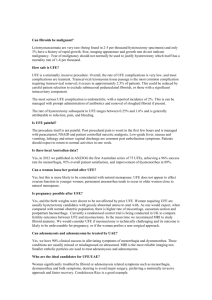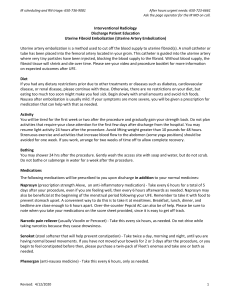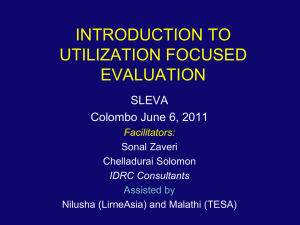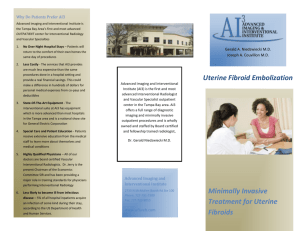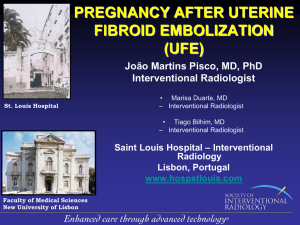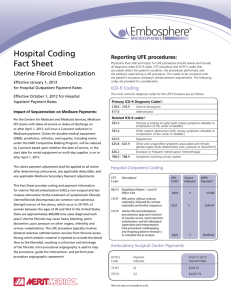Title goes here
advertisement
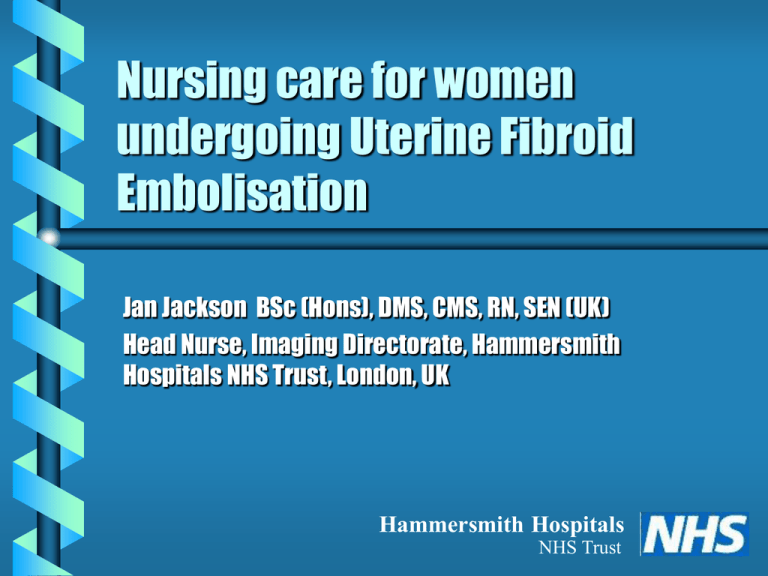
Nursing care for women undergoing Uterine Fibroid Embolisation Jan Jackson BSc (Hons), DMS, CMS, RN, SEN (UK) Head Nurse, Imaging Directorate, Hammersmith Hospitals NHS Trust, London, UK Hammersmith Hospitals NHS Trust UFE - Background First used in late 1970s to control post- partum bleed Ravina et al (1995) published results on treatment for UF disease - effective in controlling symptoms 80-94% - fewer complications - over 7,000 women treated UFE - Reputation Reputation of being ‘quick and safe’ UF - What are they? Common growths in female population (20 - 50%) Smooth muscle in origin Predominantly benign May be associated with reproductive disorders Asymptomatic fibroid do not require treatment UF - Type of Fibroid Intramural - common and develops in the wall of uterus Subserosal - develops under outside covering of uterus Submucosal - develops under the inner lining of the uterus and is lease common and problematic UF - Population affected Increased incidence between the ages of 35 - 49 Afro-Caribbean women higher risk Generic and hormonal factors UF - Symptoms Abnormal vaginal bleeding (menorrhagia) Pelvic pain Pelvic pressure (large fibroid) on bladder, bowel, kidneys causing increases urination, constipation Infertility, recurrent spontaneous abortion, pre-term labour UF - Diagnosis Physical exam (bimanual-abdomen) Ultrasound MRI Hysterosalpingogram CT Hysteroscopy UF – Diagnosis (Con’t) Ultrasound UF – Diagnosis (Con’t) Magnetic Resonance Imaging UF – Diagnosis (Con’t) Hystersalpingogram UF - Treatment options Symptoms management - NSAID - Hormone Therapy Surgery - Hysterectomy - Myomectomy UF - Treatment options (cont) Hysterectomy UF - Treatment options (cont) Endometrial ablation Thermal ablation of uterus fibroid - percutaneous insertion of laser fibres - focussed US Uterine Fibroid Embolisation (UFE) Uterine Fibroid Embolisation (UFE) Less invasive Non-surgical Performed by Interventional Radiologists Blood flow in the right and left uterine arteries is occluded and the fibroids are deprived of their blood supply Occlusion leads to necrosis and death of the fibroids UFE - Indications Referred by gynaecologist Symptomatic patients who have failed other therapy or do not wish to have surgery UFE – Contraindications Coagulation disorder or other contraindication to angiography Infection Other uterine pathology e.g. endometriosis, adenomyosis, cancer Patients who desire fertility and have exhausted other alternatives UFE – Before Procedure Pelvic US TA/TV or MRI Excluding malignancy Gynaecological examination - reviewed Discuss with interventional radiologist Procedure explained Patient information leaflet Consent UFE THE ROLE OF THE IMAGING NURSE UFE - Patient preparation Hammersmith Hospitals NHS Trust HAMMERSMITH HOSPITAL Surname RADIOLOGY DEPARTMENT First name(s) VASCULAR ROOM Hospital Number Extension: 34943 Date of Birth Blood Test Diabet. Status . " Appointment times are approximate, and are subject to change, but we will keep you informed. Please inform us of any problem with this appointment." Level Reference level < 1.2 22.0 - 29.0 secs 120 - 400 9.0 - 12.0 secs 60 - 125 umol/l INR APTT Platelets PT Creatinine Diabetic Yes Last BM __________ Date No NIDDM ________________ IDDM ____________________ Time __________ Urinary catheter in place. On Metformin Yes No IV access in situ. To be administered 1/2 hr prior to procedure Voltarol suppositoire 100mg Preg. Status Information for patients UTERINE FIBROID EMBOLISATION __________________________________________________ Please inform Imaging Department of any abnormal results. Only for female patients of child bearing age. Date of last LMP _____ / _____ / _____ If LMP more than 10 days: Pregnancy Test Positive Negative Fasting: Fasting HAVING A UTERINE FIBROID EMBOLIZATION l Documentation Directorate of Imaging Appointment Ward Type: Time: - No solid food for 4 hours prior to procedure. - Clear fluids: offered up to 2 hours prior to procedure, then nil by mouth. * The max. intake of clear fluids between 4 and 2 hours preprocedure is 1 litre only. PLEASE COMPLETE INVASIVE PROCEDURE CHECKLIST AS WELL AS THE IMAGING ONE I.P. Checklist Completed Procedure discussed and documented in medical notes Signature ___________________ Print __________________ Date __ / __ / __ Time ___:___ UFE - Patient preparation Imaging nurse visits patient prior to procedure Assessment Patient preparation instruction Analgesia Antibiotic Nursing documentation DIRECTORATE OF IMAGING RADIOLOGY NURSING PROCEDURE RECORD Date: ________________________________ Name: ___________________________________ Procedure: ____________________________ Hospital No.: ______________________________ Radiologist: ___________________________ D.O.B.: _____________ Age: _____________ Sex: M / F Ward: ____________ Scrub Nurse: __________________________ Anaesthetist: __________________________ Pre-procedure visit/information Yes / No Pre-procedure Assessment Nurse__________________ Name Band checked by: _________________ Date __________ Blood results Consent obtained: Yes / No Hb ________ WBC ______ Platelets ________ PT_________ APTT ______ TT Fib ________ INR Pre-medicated: ________________________ ___________ Allergies: _____________________________ ______ Other ___________ Nil by mouth from: ______________________ Language Spoken: English Other___________ Translator: Yes / No Translator Present: Yes / No Bilateral groin shaved: Yes / No / NA Pedal Pulses: Rt ______ Lt ______ Relevant Medical History _______________________________________ Relevant Drugs _________________________________________ _______________________________________ _________________________________________ _______________________________________ _________________________________________ _______________________________________ _________________________________________ _______________________________________ Drug Sensitivities:___________________________ IV access _______________________________ Diabetic: _______________________________________ Blood Sugar Level: ________mmol/L Infusions: _______________________________ Asthmatic: Yes / No Yes / No ________________________________________ Infectious status: ________________________ TIME Arrival in Radiology ______________________ Started: _____________ Finished: ______________ Ward Called: ____________________________ Collected ____________ Destination ____________ UFE - Hammersmith Hospital Pre -procedure Patient admits to ward Seen by radiologist - consent Prepare for procedure e.g. NBM, shaved Collected by IA to Imaging Imaging nurse received patient and hand over from ward nurse Check patient Medication - Diclofenac suppository 100 mg UFE - Hammersmith Hospital Procedure Technique Conscious sedation Local anaesthesia Femoral puncture Pelvic arteriogram performed Use of microcatheters and guidewires to select uterine arteries PVA Final uterine arteriogram UFE - Arteriogram UFE - conscious sedation Adult Sedation policy To allow gastric emptying: - Solid food up to 4 hours prior to procedure. - Clear fluids up to 2 hours prior to procedure. - Nil by mouth. American Society of Anaesthesiologists Task Force on Sedation and Analgesia by non-anaesthesiologists (1996) Practice guidelines for sedation and analgesia by non-anaesthesiologists UFE - Peri-procedure Conscious sedation Pain management - pain assessment Monitor vital signs Comfort and reassuring patient Documentation UFE - Nursing documentation. PERI-OPERATIVE PROCEDURAL OBSERVATIONS NURSING INTERVENTIONS ECG, Blood Pressure, Pulse, Respiration, O 2 Saturation, O2, Temperature and Medication Recordings Intra Procedure Date Time B L O O D P R E S S U R E P U L S E 220 210 200 190 180 170 160 150 140 130 120 110 100 90 80 70 60 50 40 30 20 10 0 Respiratory Post Procedure Evaluation Self Ventilating O2 __________ L / min Via Mask Nasal cannula GA Intubated Ventilated Cardiovascular Refer to observation chart Neurological Conscious level Awake Rousable Self ventilating O2 __________ L / min for ______ hr Chest X-Ray Checked Infusion: _______________________ --------------------------------------------------- Pain Hygiene/ Dressing Drowsy Specify __________ Analgesia Sedation Local Anaesthesia Refer to observation chart Conscious level Fully awake Drowsy Orientated Other ________________________ Pain free Comfortable Pain scale 0 – 5: _________ (1 = no pain, 2= mild, 3 = moderate, 4 = severe, 5 = unbearable) Puncture site ____________________ Puncture site: Right Left Femoral artery: Right Left Pedal pulses Jugular vein: Right Left Drainage _______________________ Specimens taken_________________ Respiration O2 Sat % Ultrasound guidance O2 L / Min ECG Rhythm DRUGS Lidocaine % Buscopan ml mg Glucagon mg Fentanyl mcg Hypnovel mg Heparin units Fluoroscopy Nursing Documentation _________________________________________________________________________________ _________________________________________________________________________________ _________________________________________________________________________________ _________________________________________________________________________________ _________________________________________________________________________________ _________________________________________________________________________________ Contrast Batch no Notes and property returned with patient Yes / No Signature _________________________________ Print Name ____________________________ Date _____________________________________ Time _________________________________ Ward Nurse Signature _______________________ Print Name ____________________________ UFE – Pain Management During Procedure Pain assessment Medications - Hypnovel IV (Midazolam) - Diamorphine IV - Zofran IV (Ondansetron) - Paracetamol infusion UFE - Post procedure Recovery Pain management Anti-nausea medication Activities - bed rest Education - patients, ward nurse UFE - Post procedure pain Start shortly after 2nd uterine is occluded Worsen for 2 hours then plateau for 6-8 hours Improvement over next 12 hours Improve over next several days UFE - Post procedure Pain Management Diclofenac 50mg oral 8 hrly Tramadol 50mg oral 6 hrly Anti-emetic. Zofran or Cyclizine UFE - Post Procedure Syndromes Pyrexia, nausea and vomiting Pelvic pain Could last up to 24 - 48 hours and up to 7 days Worse with large and multiple fibroids UFE - Complications Groin haematoma Pelvic pain Uterine infection leading to hysterectomy 0.5 - 2% Fibroid impaction Premature ovarian failure (menopause) 1 5% Non-target organ ischaemia 2 reported deaths related to infection UFE - Discharge instructions Femoral instruction site care Contact number Follow-up appointment Pain control Anti-emetic Shower Nothing in vagina for 2-3 weeks (no sexual intercourse, no tampon) UFE - Benefits Treats all fibroid simultaneously Permanent infarction without regrowth Minimally invasive Preserve options for other therapies Effective in controlling bleeding Significant uterine volume reduction Shorter recovery times UFE - Benefits (cont) Clinical success 80 - 94% Average reduction of fibroid volume 41 - 64% Reported pregnancy post UFE UFE - NICE Guidelines July 2003 Remains uncertain over safety and effectiveness Both gynaecologists and radiologists are involved in the decision to carry out procedure BSIR Registry Systemic review UFE - Conclusion Good short term results Require long term follow-up Need to carry out RCT Effect on pregnancy References Walker, WJ – Uterine Artery Embolisation for Symptomatic Fibroids: Clinical Result in 400 Women with Imaging Follow-up Siskin, GP et al (2000) – Outpatient Uterine Artery Emblisation for Symptomatic Uterine Fibroids: Experience in 49 patients, JVIR 11:305-311 National Institute of Clinical Excellence (NICE) – Uterine artery embolisation for fibroids, 2003 Ryan, JM et al (2002) – Simplified Pain-Control Protocol after Uterine Artery embolisation, Radiology 2002;224:610-613
